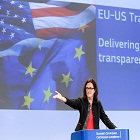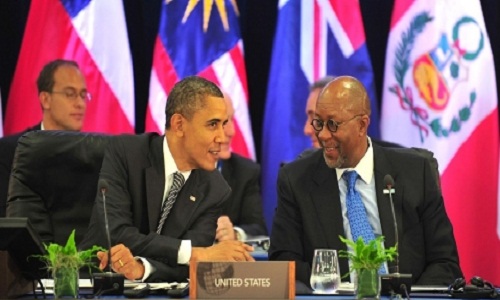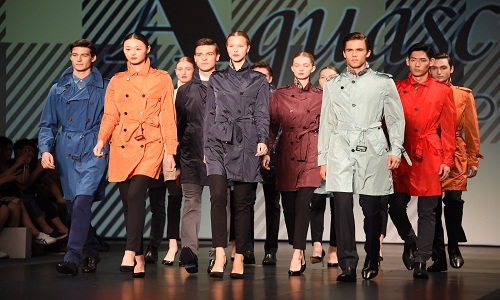FW
Three small green businesses that offer ethical apparel in New York, Arizona and Wisconsin were proclaimed winners of Green America's ‘People & Planet Award.’ The winners of the $5,000 prizes are Themis and Thread, Fed By Threads and Fair Indigo. The winners were selected by enthusiasts during a month-long online voting period. The award recognizes innovative US small businesses that integrate environmental and social considerations into their strategies and operations.
Fran Teplitz, Green America's executive co-director, informed choosing clothing made ethically and with consideration to the environment was one of the best ways to support social and ecological responsibility in your day-to-day life by literally wearing it on your sleeve. He further said that his company applauds these small businesses for their work to help people and the planet with each garment they produce.
Jesse Beardslee, Founder of Themis and Thread, explained his company will use the prize money to purchase vintage and American-made sewing equipment. This would complement the machine that they already have ‘a 1940's Singer Featherweight 221’.
Alok Appadurai, Co-founder and CEO of Fed by Threads, said it was an honour to be recognized for the company’s commitment to end hunger in America. This was possible by supporting living wage garment jobs nationwide, reducing food waste and increasing demand for organic sustainable sweatshop-free apparel.
Finally, Robert Behnke, Co-founder and President of Fair Indigo was happy at receiving the award. He said his company strongly believes the best way one can contribute to a cleaner, greener apparel industry was to grow the market for fairly traded and earth-friendly clothing which supports organic farmers and small-scale humane production.
The next round of Green America's award will be announced in early 2017. That occasion would be the first time one of the three winning companies will receive $10,000 while the other two will each receive $5,000.
The International Monetary Fund (IMF) has asked the Cambodian government to improve the country’s business climate and enhance competitiveness by upgrading infrastructure, improving the quality of labour and strengthening governance. It should do so on the lines of China that changes its trade pattern by moving up the value chain, it added. China is a major investor in Cambodia that pumps in $2 billion by way of grants, loans and direct assistance with foreign direct investment (FDI) reaching $10 billion since 1990.
According to the IMF’s ‘China’s Changing Trade and the Implications for the CLMV’ report that was released on September 1, the evolution of Chinese trade, investment and consumption patterns offers opportunities and challenges to low-wage, low-income countries, including China’s neighbours in the Mekong region like Cambodia, Laos, Myanmar and Vietnam (CLMV) which are all open economies highly integrated with China.
The IMF report said rebalancing in China may mean less of a role for commodity exports from the region. But at the same time, the CLMV’s low labour costs suggest that manufacturing assembly for export could take off as China becomes less competitive, and as China itself demands more consumption items. The IMF’s report recommended that Cambodia take full advantage of opportunities arising from China’s potential exit from labour-intensive industries by upgrading infrastructure to reduce logistics costs, find cheaper, more reliable, and more accessible electricity. Cambodia should also strengthen the legal framework for public-private partnership projects to possibly facilitate infrastructure investment, it remarked.
Garment manufacturers and traders have questioned the logic of planned move by truck owners to increase rentals, as a consequent to the recent increase in fuel prices. They feel, any further increase in transportation charges could make the products from Tirupur knitwear cluster uncompetitive in other parts of the country. K.S. Babuji, Secretary of Small Cotton Shirt and Inner Wear Manufacturers Association (SISMA) says according to the information received by them, truck operators are planning to increase their fare to Rs 300 for every 100 km.
Babuji opined that the predominant small/medium scale hosiery manufacturers in Tirupur cluster were worried over the attitude of both the government machinery and the truck operators when it comes to fuel price mechanism. He said that while truck operators raise the charges when fuel prices go up, but they do not lower their rates when fuel prices decrease.
Upon questioning about the same, Tirupur Lorry Owners Association president C N Ramsamy hinted at the possibility of increasing the charges but stated that no decision was taken on the scale of hike.
The apparel manufacturers are of the feeling that the sake prices of fuel were high only because of the exorbitant levy of taxes and duties. R M Senthilkumar, former chairman of Institute of Chartered Accountants of India (Tirupur chapter), does not see any chance of the government bringing down the duties and taxes on fuel as it was considered as a revenue generation tool for the exchequer. However, he is of the view that some corrections need to be made as otherwise high fuel prices could trigger an inflationary trend.
Global clothier Gap has disclosed the factories which produce its garments. Fashion retailers Marks & Spencer and C&A, Nike, Levi’s and Adidas too have done the same exercise. Such disclosures are a boon for transparency in an industry that has rife with abuse. A million workers currently produce Gap clothing in 885 factories in about 30 countries around the globe. The company has reduced the number of supplier factories from about 2,000 six years ago to be able to manage relations.
Retailers were in the past reluctant to invite greater scrutiny by identifying their suppliers. They were concerned this could give competitors a window on a company’s clothing in production. Gap has revealed the names and street addresses of suppliers in countries such as China, Bangladesh, Egypt, Cambodia, Guatemala, India and Indonesia. The disclosures will lead to greater accountability for vendors and for Gap.
The growing number of apparel industry leaders disclosing factories is seen as good news for workers, the industry, and consumers. Activists have targeted the highly profitable fast-fashion industry, which churns out new low-cost garments daily or weekly to maximize sales volumes, and called on retailers to improve labor and environmental conditions at supplier factories in the impoverished developing world.
California-based anti-slavery charity As You Sow, says one of the most effective ways to curb forced labour in the garment industry is to target cotton spinning mills where workers can provide valuable information about the source of material in the fashion supply chain. The apparel industry in Bangladesh has come under pressure to improve factory conditions and workers’ rights, particularly after the collapse of the Rana Plaza complex in Bangladesh more than three years ago, when 1,136 garment workers were killed.
Following the tragedy, a number of initiatives were launched by global brands and charities to promote openness and safeguard employees, from ensuring the safety of buildings to providing better pay and working hours. But while most projects focused on farmers growing cotton in the fields or factory workers stitching clothes, few focused on the workers of spinning mills in the middle of the supply chain.
Run by the California-based charity, the Responsible Sourcing Network (RSN) launched a project focusing on mills in India and Bangladesh that together employ thousands of workers. Based in the middle of the supply chain, spinning mills are uniquely positioned to identify cotton produced with forced labour and prevent it from entering corporate supply chains was what Patricia Jurewicz, RSN’s director had to say on this topic. Jurewicz also revealed that thousands of young women are kept in bonded labour in spinning mills in southern India. This is where women are lured from their homes with the promise of a good job, but in reality they work in appalling conditions. The US and Britain have adopted laws that ban the import of goods produced by forced labour or require companies to report action taken to address slavery and trafficking.
A conference on the European textile and clothing industry will be held in Belgium on October 12 and 13, 2016. This will showcase the high-tech materials, advanced production technologies, new business models and growth markets for the textile industry of the future. The European textile and clothing industry is rapidly adopting advanced digitised manufacturing processes and technologies, using smart materials and exploring new high value added growth markets for textile based solutions.
The event is expected to bring together innovators, technology providers, researchers, clusters and other actors from the textile and clothing sectors from across Europe. A series of sessions will be dedicated to key technology developments in the major manufacturing stages such as fabric formation, textile surface processing and assembly and fashion production, market opportunities and technology trends in key technical textile application areas such as construction, health care, sports, protection, environment and agriculture.
Textiles and clothing play an important role in the European manufacturing industry, employing 1.7 million people. To maintain its competitiveness the sector has made a move toward products with higher value added. The sector accounts for a three per cent share of value added and a six per cent share of employment in total manufacturing in Europe.
Aquascutum, the acclaimed luxury fashion label from the UK, showcased its rich British heritage and timeless aesthetics at the fashion show in CENTRESTAGE. “As a leader in original fashion design, we supported CENTRESTAGE with this spectacular fashion show,” said Shirley Chan, Executive Director and CEO, YGM Group, “We acquired this brand a few years ago and hold worldwide rights for it. Aquascutum stands for sharp sophistication and understated elegance.”
The occasion commemorated Aquascutum’s 165th anniversary. Showcasing 60 different looks, including iconic pieces from archives and classic club check designs that highlight impeccable craftsmanship and timeless appeal. An exclusive preview of the label’s F/W ’16 and S/S17, menswear and womens wear collection showcased its creative reinterpretation of classic yet modern wardrobe staples embodying luxury and authenticity. The pioneer brand in waterproof wool paid homage to the quintessential British style, with its signature look on the ramp.
Aquascutum was founded in 1851, by a quality tailor-John Emary with the mission to provide stylish protection from unpredictable British weather. YGM Trading company acquired the license for Aquascutum for HK and Greater China in 1998, later in 2009, it acquired intellectual property rights for Asia and in 2012 YGM took complete control of brand by acquiring globally its UK arm.
"Sidefame a marketing company, part of the Fenix group, gathered eight of its brands showcasing 84 sets of outfits from the latest Fall/Winter collection, encompassing a diverse mix of fashion styles. To mark the occasion, Sidefame invited celebrities including Myolie Wu, Jade Lui, Janet Ma, Mikki Yao, Ana R and Cara G."

Sidefame a marketing company, part of the Fenix group, gathered eight of its brands showcasing 84 sets of outfits from the latest Fall/Winter collection, encompassing a diverse mix of fashion styles. To mark the occasion, Sidefame invited celebrities including Myolie Wu, Jade Lui, Janet Ma, Mikki Yao, Ana R and Cara G.

Brands showcased at CENTRESTAGE include: Italian brands Anteprima and Anteprima Wirebag; Japanese designer Atsuro Tayama’s eponymous brand Atsuro Tayama and diffusion line, A.T by Atsuro Tayama a brand that originated in Paris, famous for its elegant design with a hint of masculinity exuded from within; Marimekko a Finnish design company renowned globally for its original prints design and fabrics; and 45R, a Japanese brand famous for its classic denim and indigo dyed range; Cocktail, which sources and features over 40 fashion and lifestyle labels across the globe; and the handmade Italian brand Henry Cuir, the brand features around 25 artisans, including designer Henri Beguelin himself.
HK-based Sideframe established in 1987 as the retail subsidiary of Fenix Group Holding, operates retail stores in HK, China, Macau and Singapore. The company markets a range of fashion and lifestyle brands around the region through joint venture and franchise agreements. Sideframe has also launched a private label ‘Code’

Aquascutum, the acclaimed luxury fashion label from the UK, revealed its rich British heritage and timeless aesthetics at the fashion show held here on Sept 8 in CENTRESTAGE.
“As a leader in original fashion design, we supported CENTRESTAGE with this spectacular fashion show, said Shirley Chan , Executive Director and CEO, YGM Group , “ we acquired this brand a few years ago and we hold worldwide rights for this brand, Aquascutum stands for sharp sophistication and understated elegance .”
The occasion commemorated Aquascutum’s 165th anniversary , showcasing 60 different looks, including iconic pieces from the house’s archives and classic club check designs that highlight the impeccable craftsmanship and timeless appeal. An exclusive preview of label’s FW 16 and SS17, menswear and womenswear collection showcased its creative reinterpretation of classic yet modern wardrobe staples embodying luxury and authenticity. The pioneer brand in waterproof wool paid homage to the quintessential British style, with its signature look on the ramp.
Aquascutum founded in 1851, by a quality tailor-John Emary with the mission to provide stylish protection from unpredictable British weather. YGM Trading company acquired the license for Aquascutum for HK and Greater China in 1998, later in 2009, it acquired intellectual property rights for Asia and in 2012 YGM took complete control of brand by acquiring globally its UK arm
"As US and parts of Europe gears up for elections, the timeline for the much anticipated Transatlantic Trade and Investment Partnership (TTIP) between EU and the US, seems to get pushed further. As per Hong Kong Trade Development Corporation (HKTDC), the US and the EU together account for 47 per cent global GDP and 29 per cent of world trade and the TTIP is undoubtedly the world’s largest trade and investment agreement. Despite Brexit, both US and EU indicate 2016 as the timeline. "

As US and parts of Europe gears up for elections, the timeline for the much anticipated Transatlantic Trade and Investment Partnership (TTIP) between EU and the US, seems to get pushed further. As per Hong Kong Trade Development Corporation (HKTDC), the US and the EU together account for 47 per cent global GDP and 29 per cent of world trade and the TTIP is undoubtedly the world’s largest trade and investment agreement. Despite Brexit, both US and EU indicate 2016 as the timeline. Hence, if the deal is concluded TTIP will be the key to strengthen transatlantic trade and investment link, providing a major boost to economies on both sides.TTIP and its relevance for the US, EU

TTIP is an ambitious, comprehensive and high-standard bilateral trade and investment agreement aimed at creating opportunities for businesses, workers and farmers on both sides of the Atlantic. It is intended to boost transatlantic trade and investment linkages at a time of modest economic growth by eliminating customs duties, removing or greatly reducing red tape and tearing down barriers that impede trade both in goods and services. This in turn is expected to add new employment opportunities to the existing 13 million plus jobs that are supported by transatlantic trade and investment.
The US is already the EU’s largest export market and its largest source of FDI, while the EU is the US’s second largest market (after Canada) and also its largest source of FDI. TTIP's eventual impacts on both transatlantic and global economic growth and investment will undoubtedly be very substantial. Although there have been advanced talks, the process has faced opposition in EU from consumer, environmental, labour and other civil society groups who strongly believe TTIP would lessen or outright dismantle EU protections and standards. There also appears to be a growing scepticism towards free trade in the US as the presidential campaign heats up.
Moreover Brexit may not have an immediate impact on the EU negotiating position but the impact of British departure will increase gradually. As a strong supporter of trade liberalisation, the UK could have been expected to act as a facilitator during the negotiations and its absence is likely to make a final deal harder to achieve as certain EU members may feel more emboldened to make tougher demands in various areas that may not be acceptable to the US. Post Brexit , it is believed that the overall value of TTIP for the US will diminish somewhat if the UK is taken out of the equation as UK is the largest market for US exports in the EU, taking up the lion’s share of more than 20 per cent of total shipments to the EU in 2015.
TTIP’s implication on global trade rules
The impact of TTIP would probably be moderate over the short term as new rules and regulations are likely to be phased in gradually. However, its longer-term implications are expected to be significant. An Ecorys report projects GDP to be 0.5 per cent higher each year for the EU and 0.4 per cent higher for the US after TTIP is fully implemented. Meanwhile, wages for both high- and low-skilled workers are expected to go up by 0.5 per cent in the EU, compared with 0.3 per cent for high-skilled workers and 0.4 per cent for low-skilled workers in the US. Total EU and US exports are expected to increase by 8.2 per cent and 11.3 per cent respectively, with a 27 per cent increase in EU exports to the US and an almost 36 per cent gain in US exports to the EU.
TTIP also has long term impact on multilateralism and global trade rules as it represents an unprecedented effort to complement traditional tariff liberalisation with broad-ranging commitments on regulatory co-operation and a joint rules-based framework for bilateral trade and investment. TTIP will thus boost global trade rules for decades to come depending on the level of ambition of US-EU regulatory cooperation and coherence efforts which can result in globally-prevalent regulations and standards.













